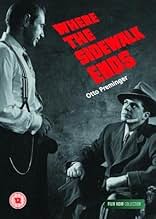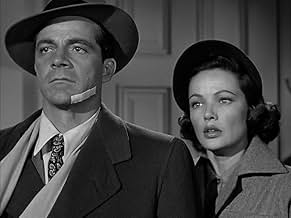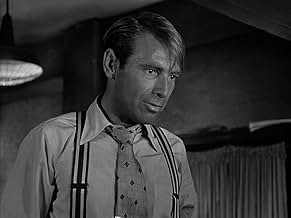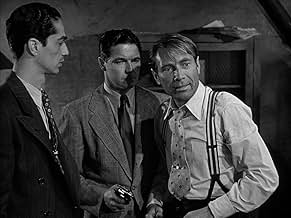IMDb RATING
7.5/10
11K
YOUR RATING
Det. Sgt. Mark Dixon wants to be something his old man wasn't: a guy on the right side of the law. Will Dixon's vicious nature get the better of him?Det. Sgt. Mark Dixon wants to be something his old man wasn't: a guy on the right side of the law. Will Dixon's vicious nature get the better of him?Det. Sgt. Mark Dixon wants to be something his old man wasn't: a guy on the right side of the law. Will Dixon's vicious nature get the better of him?
- Awards
- 1 win total
Fred Aldrich
- Detective at Staff Meeting
- (uncredited)
Don Appell
- Willie Bender
- (uncredited)
David Bauer
- Sid Kramer
- (uncredited)
Eddie Borden
- Pool Hall Patron
- (uncredited)
Neville Brand
- Steve
- (uncredited)
Barry Brooks
- Thug
- (uncredited)
Ralph Brooks
- Railroad Baggage Clerk
- (uncredited)
Oleg Cassini
- Oleg
- (uncredited)
John Close
- Hanson
- (uncredited)
Featured reviews
At first glance, it would seem natural to compare Where the Sidewalk Ends with Laura. Both have noirish qualities, both were directed by Otto Preminger, and both star Dana Andrews and Gene Tierney. But that's where most of the comparisons end. Laura dealt with posh, sophisticated people with means who just happen to find themselves mixed-up in a murder. Where the Sidewalk Ends is set in a completely different strata. These are people with barely two nickels to rub together who are more accustomed to seeing the underbelly of society than going to fancy dress parties. Where the Sidewalk ends is a gritty film filled with desperate people who solve their problems with their fists or some other weapon. Small-time hoods are a dime-a-dozen and cops routinely beat confessions out of the crooks. Getting caught-up in a murder investigation seems as natural as breathing.
While I haven't seen his entire body of work, based on what I have seen, Dana Andrews gives one of his best performances as the beat-down cop, Det. Sgt. Mark Dixon. He's the kind of cop who is used to roughing up the local hoods if it gets him information or a confession. One night, he goes too far and accidentally kills a man. He does his best to cover it up. But things get complicated when he falls for the dead man's wife, Morgan Taylor (Tierney), whose father becomes suspect number one in the murder case. As Morgan's father means the world to her, Dixon's got to do what he can to clear the old man without implicating himself.
Technically, Where the Sidewalk Ends is outstanding. Besides the terrific performance from Andrews, the movie features the always delightful Tierney. She has a quality that can make even the bleakest of moments seem brighter. The rest of the cast is just as solid with Tom Tully as the wrongly accused father being a real standout. Beyond the acting, the direction, sets, lighting, and cinematography are all top-notch. Overall, it's an amazingly well made film.
If I have one complaint (and admittedly it's a very, very minor quibble) it's that Tierney is almost too perfect for the role and her surroundings. It's a little difficult to believe that a woman like that could find herself mixed-up with some of these unsavory characters. It's not really her fault, it's just the way Tierney comes across. She seems a little too beautiful, polished, and delicate for the part. But, her gentle, kind, trusting nature add a sense of needed realism to her portrayal.
While I haven't seen his entire body of work, based on what I have seen, Dana Andrews gives one of his best performances as the beat-down cop, Det. Sgt. Mark Dixon. He's the kind of cop who is used to roughing up the local hoods if it gets him information or a confession. One night, he goes too far and accidentally kills a man. He does his best to cover it up. But things get complicated when he falls for the dead man's wife, Morgan Taylor (Tierney), whose father becomes suspect number one in the murder case. As Morgan's father means the world to her, Dixon's got to do what he can to clear the old man without implicating himself.
Technically, Where the Sidewalk Ends is outstanding. Besides the terrific performance from Andrews, the movie features the always delightful Tierney. She has a quality that can make even the bleakest of moments seem brighter. The rest of the cast is just as solid with Tom Tully as the wrongly accused father being a real standout. Beyond the acting, the direction, sets, lighting, and cinematography are all top-notch. Overall, it's an amazingly well made film.
If I have one complaint (and admittedly it's a very, very minor quibble) it's that Tierney is almost too perfect for the role and her surroundings. It's a little difficult to believe that a woman like that could find herself mixed-up with some of these unsavory characters. It's not really her fault, it's just the way Tierney comes across. She seems a little too beautiful, polished, and delicate for the part. But, her gentle, kind, trusting nature add a sense of needed realism to her portrayal.
Produced and directed by Otto Preminger, and starring Dana Andrews, the king of the B-movies, this is a terrific 20th-Century Fox film noir, all heavy woollen topcoats, stylish wide-brimmed hats and skewed camera angles. It's a film with a superb 'dark' look and a Ben Hecht script which delivers the authentic cadences of noirspeak.
Mark Dixon is a tough cop. His father was a small-time hood, and Dixon feels he has something to prove. He uses street methods, roughing-up bad guys and bullying stoolpigeons. He is not liked by his superiors, and has remained a detective sergeant, whereas his contemporary Lewis (Karl Malden) has played it by the book and has risen to the rank of lieutenant. Lewis is now Dixon's boss, and there is considerable tension between the two men.
Enter Ken Paine (Craig Stevens), a two-bit crook and bagman for Scalise (Guy Merrill). Tall, dark and handsome, and a much-decorated war hero, Paine is a drinker and a punk who lurks around cheap crap games. He is dating a dame by the name of Morgan Taylor (Gene Tierney), a looker with a whiff of glamour about her. Morgan is a fashion model in a Manhattan department store by day, and an 'escort' in Scalise's gambling club by night. Jiggs Taylor, her father (Tom Tulley), is a New York cabbie with a fondness for telling tall stories.
Dixon is on his last chance. The captain has made it clear - no more rough stuff. Then something dreadful happens, and Dixon panics and tries to cover it up. He sets in motion a train of events which he can't control, especially after he becomes emotionally involved with the beautiful Morgan. Dixon's tormented soul is the film's battleground, the instinct for self-preservation warring with a guilty conscience and a need to earn the girl's respect.
Though they do not spoil the movie, there are some things in the story which don't quite add up. A detective openly discusses a current investigation with a yellow cab driver, something which even the unorthodox Dixon would never do. Dishes are served to Dixon and Morgan in the restaurant, even though they didn't order anything specific. How is Morgan able to get to Paine's apartment in the couple of minutes which elapse after she hears the news? Why do the police interrogate Jiggs at the scene, in the presence of his daughter? Surely the detectives know better than to subject Jiggs to a confrontation ID without allowing him access to legal advice?
A 'noir' is nothing if not atmospheric, and this one is dripping with atmosphere. Brooklyn Bridge looms high over the mean streets, a skeletal silhouette which haunts the action like some urban angel of doom. New York City is the matrix in and through which these characters function, the context of their entire existence, and its presence is constantly felt. Whether by means of an el-train overhead, or a forest of skyscrapers swimming into focus through the locker-room window, the city surrounds and bears in upon these people, the malevolent nest through which they are obliged to scurry.
Dana Andrews is excellent as Dixon, the tough guy who retains our sympathy because he is capable of remorse. Watch out for Scalise's masseur, a very young Neville Brand.
It doesn't always help to be innocent, says Dixon, the hard man conscious of the harsh ways of the city, but the wretchedness of a guilty conscience is a terrible burden to bear. The camera conveys this beautifully, with a brooding Dixon large in the foreground as the investigation proceeds, and earlier, his horrified face twisted by a fish-eye lens as he realises the enormity of what he has done.
Verdict - A murky, grim film noir ... marvellous!
Mark Dixon is a tough cop. His father was a small-time hood, and Dixon feels he has something to prove. He uses street methods, roughing-up bad guys and bullying stoolpigeons. He is not liked by his superiors, and has remained a detective sergeant, whereas his contemporary Lewis (Karl Malden) has played it by the book and has risen to the rank of lieutenant. Lewis is now Dixon's boss, and there is considerable tension between the two men.
Enter Ken Paine (Craig Stevens), a two-bit crook and bagman for Scalise (Guy Merrill). Tall, dark and handsome, and a much-decorated war hero, Paine is a drinker and a punk who lurks around cheap crap games. He is dating a dame by the name of Morgan Taylor (Gene Tierney), a looker with a whiff of glamour about her. Morgan is a fashion model in a Manhattan department store by day, and an 'escort' in Scalise's gambling club by night. Jiggs Taylor, her father (Tom Tulley), is a New York cabbie with a fondness for telling tall stories.
Dixon is on his last chance. The captain has made it clear - no more rough stuff. Then something dreadful happens, and Dixon panics and tries to cover it up. He sets in motion a train of events which he can't control, especially after he becomes emotionally involved with the beautiful Morgan. Dixon's tormented soul is the film's battleground, the instinct for self-preservation warring with a guilty conscience and a need to earn the girl's respect.
Though they do not spoil the movie, there are some things in the story which don't quite add up. A detective openly discusses a current investigation with a yellow cab driver, something which even the unorthodox Dixon would never do. Dishes are served to Dixon and Morgan in the restaurant, even though they didn't order anything specific. How is Morgan able to get to Paine's apartment in the couple of minutes which elapse after she hears the news? Why do the police interrogate Jiggs at the scene, in the presence of his daughter? Surely the detectives know better than to subject Jiggs to a confrontation ID without allowing him access to legal advice?
A 'noir' is nothing if not atmospheric, and this one is dripping with atmosphere. Brooklyn Bridge looms high over the mean streets, a skeletal silhouette which haunts the action like some urban angel of doom. New York City is the matrix in and through which these characters function, the context of their entire existence, and its presence is constantly felt. Whether by means of an el-train overhead, or a forest of skyscrapers swimming into focus through the locker-room window, the city surrounds and bears in upon these people, the malevolent nest through which they are obliged to scurry.
Dana Andrews is excellent as Dixon, the tough guy who retains our sympathy because he is capable of remorse. Watch out for Scalise's masseur, a very young Neville Brand.
It doesn't always help to be innocent, says Dixon, the hard man conscious of the harsh ways of the city, but the wretchedness of a guilty conscience is a terrible burden to bear. The camera conveys this beautifully, with a brooding Dixon large in the foreground as the investigation proceeds, and earlier, his horrified face twisted by a fish-eye lens as he realises the enormity of what he has done.
Verdict - A murky, grim film noir ... marvellous!
I'm a big fan of fan of film noir, and this film by Otto Preminger easily stands as one of the best that I've seen! Preminger has reunited two of his stars from the hit 'Laura' - Gene Tierney and Dana Andrews, for an entirely different sort of crime film. Laura was based around love, and this film is based around hate; as we watch police detective Mark Dixon, a copper already suffering scrutiny from his superiors for his heavy handed tactics, accidentally kill a suspect and try to pin the murder on a known criminal; a man by the name of Tommy Scalisi. The plot is brilliantly worked, and Preminger excellently balances several plot points; but it all comes back down to the main moral implication surrounding our main character. The fact that the film is set in the criminal underground means that the plot is given an excellent base to work from, and director Otto Preminger expertly captures the sleazier side of life by showing the main characters gambling, beating one another (and their women), shooting and more - and this also helps to offset the film from the earlier 'Laura', which was very much set in upper class society.
The role of Mark Dixon gives Dana Andrews one of the most interesting parts of his career. Here, we have a character that is difficult to like as he's so cold - but the fact that we can understand his motives ensures that he's easy to sympathise with, and that allows the audience the ability to plug into his plight. The character development is well timed, and as we've follows this character and his motivations throughout the film; everything makes sense by the end. His co-star is the beautiful Gene Tierney, who isn't given as much to do in this film as she was in Laura; a film that made Tierney its linchpin. She does well with what she's got, however, and the lead duo's chemistry is excellent and Tierney helps to complete every scene she's in. I can't say that this is a better film than the earlier Laura; that's a hard act to follow, but this film certainly fits into the film noir formula better than Preminger's earlier film. The film also makes a good comparison piece for Laura; as just about everything in this film is opposite to the 1944 movie, yet it's all strangely familiar. Highly recommended to all!
The role of Mark Dixon gives Dana Andrews one of the most interesting parts of his career. Here, we have a character that is difficult to like as he's so cold - but the fact that we can understand his motives ensures that he's easy to sympathise with, and that allows the audience the ability to plug into his plight. The character development is well timed, and as we've follows this character and his motivations throughout the film; everything makes sense by the end. His co-star is the beautiful Gene Tierney, who isn't given as much to do in this film as she was in Laura; a film that made Tierney its linchpin. She does well with what she's got, however, and the lead duo's chemistry is excellent and Tierney helps to complete every scene she's in. I can't say that this is a better film than the earlier Laura; that's a hard act to follow, but this film certainly fits into the film noir formula better than Preminger's earlier film. The film also makes a good comparison piece for Laura; as just about everything in this film is opposite to the 1944 movie, yet it's all strangely familiar. Highly recommended to all!
Where The Sidewalk Ends stars Dana Andrews as a hardboiled Inspector Javert like detective whom I suspect would have been just as brutal with suspects after Miranda as before. Clint Eastwood as Dirty Harry has nothing on Andrews. He's warned by his superiors that they'll not tolerate his brutal ways.
Craig Stevens and his wife Gene Tierney have been acting as come-ons for suckers that they get to hoodlum Gary Merrill's dice game. When the latest sucker Harry Von Zell is killed by Stevens, Andrews goes after him. But a drunken Stevens punches out Andrews and Dana gets rough. What he doesn't know is that Stevens has a plate in his head courtesy of the late war and the blow that Andrews strikes Stevens with kills him.
Had he not had this reputation for brutality Andrews probably would have weathered this storm. But he does have the reputation for brutality and therefore Dana knows this could be it. Stupidly he tries to cover it up until Tierney's father Tom Tully is arrested for the murder. After that it's a matter of conscience. And it was conscience that inevitably got Javert in Les Miserables. And like Javert, Andrews has a hoodlum father whose life he's trying to live down.
Otto Preminger who directed Andrews in so many good features for 20th Century Fox like Laura, Daisy Kenyon, and Fallen Angel gets one more good performance from him as the lead. Serendipitously he's teamed with Gene Tierney his Laura leading lady who is as beautiful and as enchanting as she was in Laura albeit a little more down to earth. Gary Merrill as the crap game organizer is a real bucket of slime who also was a protégé of Dana's father. It's that surrogate son relationship that Andrews truly despises about Merrill.
Karl Malden who gives us an indication of what he would be like in Streets Of San Francisco plays Malden's lieutenant who got the promotion because Andrews was passed over. A lot of tension in that relationship.
Where The Sidewalk Ends ranks in the top 10 of Dana Andrews films and must for his fans.
Craig Stevens and his wife Gene Tierney have been acting as come-ons for suckers that they get to hoodlum Gary Merrill's dice game. When the latest sucker Harry Von Zell is killed by Stevens, Andrews goes after him. But a drunken Stevens punches out Andrews and Dana gets rough. What he doesn't know is that Stevens has a plate in his head courtesy of the late war and the blow that Andrews strikes Stevens with kills him.
Had he not had this reputation for brutality Andrews probably would have weathered this storm. But he does have the reputation for brutality and therefore Dana knows this could be it. Stupidly he tries to cover it up until Tierney's father Tom Tully is arrested for the murder. After that it's a matter of conscience. And it was conscience that inevitably got Javert in Les Miserables. And like Javert, Andrews has a hoodlum father whose life he's trying to live down.
Otto Preminger who directed Andrews in so many good features for 20th Century Fox like Laura, Daisy Kenyon, and Fallen Angel gets one more good performance from him as the lead. Serendipitously he's teamed with Gene Tierney his Laura leading lady who is as beautiful and as enchanting as she was in Laura albeit a little more down to earth. Gary Merrill as the crap game organizer is a real bucket of slime who also was a protégé of Dana's father. It's that surrogate son relationship that Andrews truly despises about Merrill.
Karl Malden who gives us an indication of what he would be like in Streets Of San Francisco plays Malden's lieutenant who got the promotion because Andrews was passed over. A lot of tension in that relationship.
Where The Sidewalk Ends ranks in the top 10 of Dana Andrews films and must for his fans.
If all "film noirs" were this good, we would have a lot more of them. If someone were to ask me what is one I would tell them to go see this movie as a perfect example. This a 50 year old movie that doesn't feel old. In other words, nothing sounds corny and stupid as others of the time. Dana Andrews had a real hard edge on his shoulder much different than in The Best Years Of Our Lives. Without giving anything away, I recommend seeing this movie "cold" like I did and be thoroughly entertained.
Did you know
- TriviaThe only feature film appearance for fashion and costume designer Oleg Cassini, who was married to Gene Tierney at the time. They would divorce in 1952. Reportedly, Cassini talked director Otto Preminger into giving him the part.
- GoofsWhen Dixon is staging the murder scene after Ken Paine' death, he is gloveless. A few seconds later he has gloves on both hands.
- Quotes
[to Detective Dixon]
Insp. Nicholas Foley: Your job is to detect criminals, not to punish them.
- Crazy creditsThe opening credits start as chalk writing on a sidewalk with someone walking over them and whistling.
- ConnectionsFeatured in Gene Tierney: Final Curtain for a Noir Icon (2008)
- How long is Where the Sidewalk Ends?Powered by Alexa
Details
- Release date
- Country of origin
- Language
- Also known as
- Al borde del peligro
- Filming locations
- 58 Pike Street, Manhattan, New York City, New York, USA(Ken Paine's apartment - between Madison and Monroe Streets - since demolished. Note Manhattan Bridge in the background)
- Production company
- See more company credits at IMDbPro
Box office
- Budget
- $1,475,000 (estimated)
- Runtime
- 1h 35m(95 min)
- Color
- Aspect ratio
- 1.37 : 1
Contribute to this page
Suggest an edit or add missing content



































